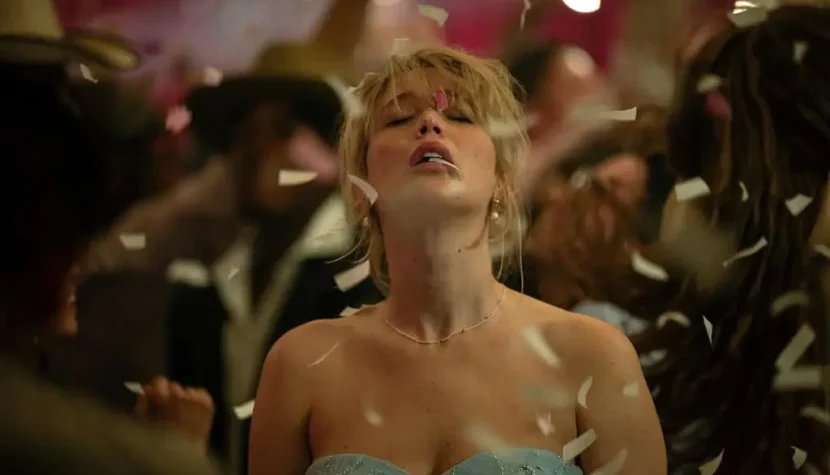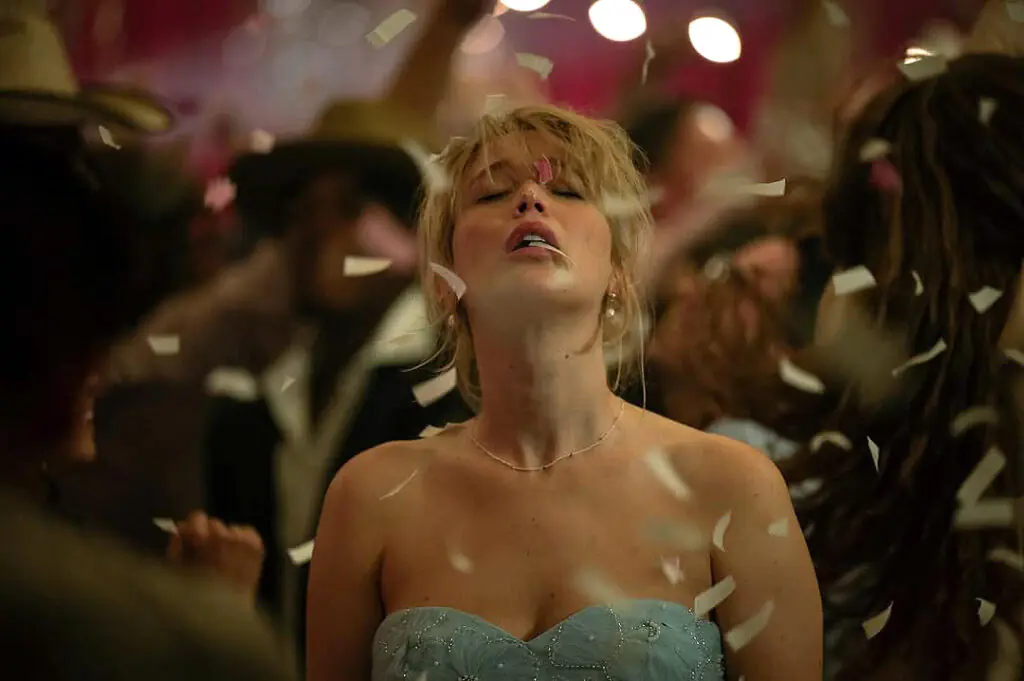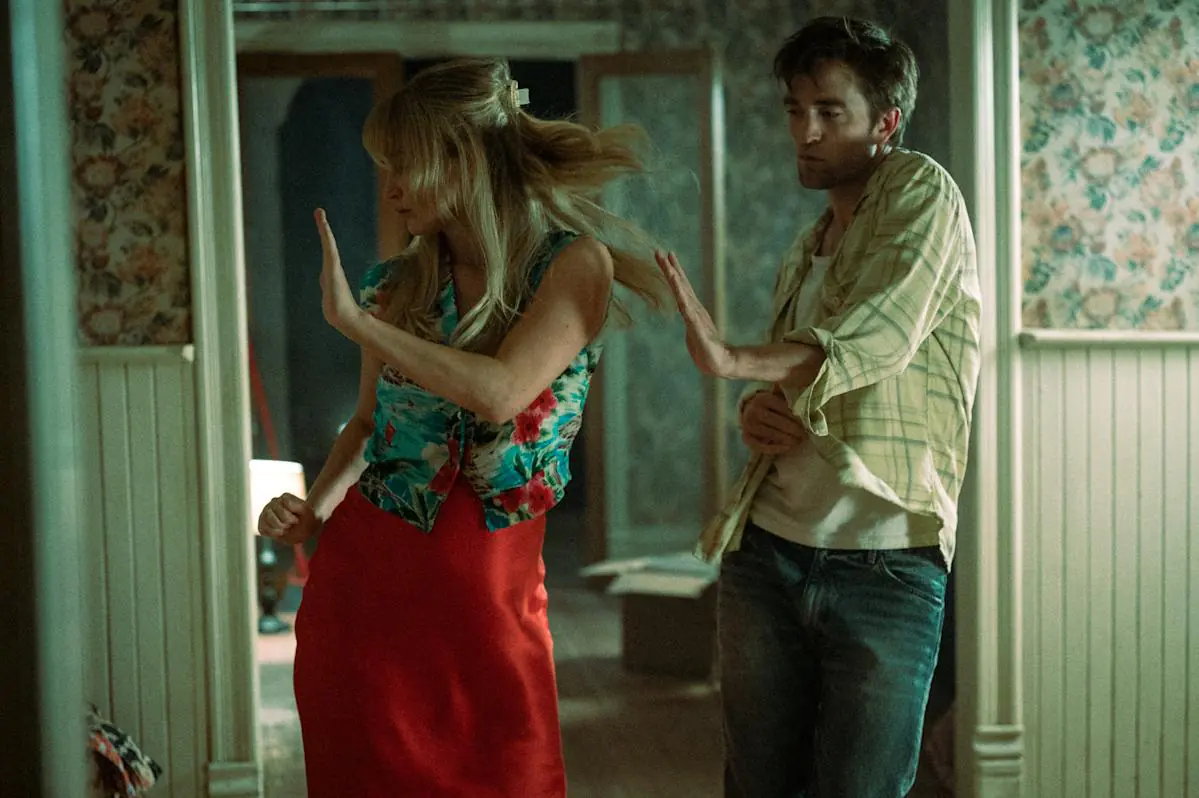DIE, MY LOVE. Jennifer Lawrence’s Most Controversial Role

Die, My Love, one of the most anticipated entries in this year’s Cannes competition, is an ecstatic, feral, and deeply contradictory film that demythologizes the idealized vision of motherhood. In her return to directing after seven years, Lynne Ramsay rips raw, animalistic instincts from Robert Pattinson and Jennifer Lawrence, pushing their acting to its most naturalistic extremes. The architect of British art cinema challenges the actors—both of whom are, in real life, new parents—to embody the emotional turmoil of early parenthood in a relationship still in its infancy.
When a child unexpectedly enters the secluded space they’ve retreated to—far from their former lavish New York life—Gracie (a feral and untamed Jennifer Lawrence) struggles to reconcile herself with the loss of freedom, madness, and sexual tension that defined the feverish passion between her and her partner. Her growing internal frustration, compounded by her partner’s lack of emotional involvement, drives her to the edge of madness. While Ramsay subtly suggests that Gracie has descended into postpartum depression, her increasingly erratic, deranged behavior points to something far more terrifying—and beyond any clinical explanation.

Madness becomes Gracie’s only form of expression, a way to satisfy the wildness of her spirit. It’s hard to imagine how the energy that bursts from her in nearly every frame could have ever fit inside the cramped New York apartment she and her partner Jackson (a phenomenal Robert Pattinson) ultimately fled. Madly in love, beautiful and talented dreamers—Gracie is an aspiring writer, Jackson dreams of being a rock star—they tear off each other’s clothes moments after crossing the threshold of their new home. The apartment’s chaos—scratched walls, broken furniture, and no intention of fixing anything—perfectly mirrors their emotional disarray.
Ramsay wastes no time: the romantic bliss and lofty career ambitions vanish in an instant when Gracie, once the untamed object of Jackson’s desire, switches from passionate lover to new mother. It quickly becomes clear that Jackson is unprepared for fatherhood—especially since he hasn’t come to terms with the demands of adult life himself. Gracie tries to engage him in parenting, emotionally investing in their new son—and, most importantly, reigniting the sex that once defined their bond. After he turns her down the first time, she resorts to masturbation. After the second, she seriously contemplates infidelity. Her fury grows with each rejection until it explodes on screen in a desperate, visceral release of unmet desire.

Die, My Love’s mystical scenery—the forest where Gracie hides her secrets, the fog-drenched deserted streets she wanders in a frenzied daze, the boarded-up shack where she meets her mysterious lover—serves as a symbolic reflection of the dark side of motherhood, a theme still rarely explored in contemporary cinema. Though occasionally overwhelming in its fragmented structure and the protagonist’s increasingly shocking choices (a bathroom demolition and a drunken wedding meltdown stand out as career-best moments for Lawrence), the film tackles the raw, often unspoken emotions that accompany early motherhood.
Pattinson’s Jackson fades into the background of this ecstatic tale, which functions both as a triumph of feminist cinema and its absolute antithesis. Gracie is without doubt one of the most complex, divisive anti-heroines in recent film—and Lawrence’s most powerful and controversial role to date. Ramsay pushes the 34-year-old actress to the brink of her endurance: from fearless nudity, to licking and scratching walls, to smashing through glass doors in a desperate cry for help. Combined with meticulously crafted elements of fantasy and mysticism, Die, My Love becomes a fiercely avant-garde, emotionally punishing exploration of modern relationships and a searing commentary on mental health—still taboo, especially when it comes to young mothers too frightened to defy societal expectations.
This unclassifiable vivisection of motherhood’s hardships is undoubtedly one of the major revelations of Ramsay’s filmography. Following her brilliant We Need to Talk About Kevin, she seems fully at home in this chaotic, symbol-rich world, built on vividly and deliberately crafted characters. For its bold and at times scandalous nature, Die, My Love is already drawing criticism and polarizing audiences at Cannes. But I’ll venture to say: it’s precisely this friction—this defiance of norms and expectations—that the film is all about.
Though it doesn’t always fully land its core message, it leaves viewers breathless and feverish—which, after all, is exactly what we hope for from a breakthrough festival screening.

